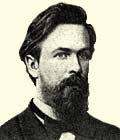
Markov, Andrey Andreyevich (1856-1922)
Mathematician who helped to develop the theory of stochastic processes, especially what are known as Markov Chains. He was born on 14 June 1856 in Ryazan, Russia.
In 1886, he was appointed professor at the University of St. Petersburg.
In 1896, he was appointed member of the Russian Academy of Sciences.
Until 1900, he worked on number theory and analysis, especially with regard to continued fractions, the limits of integrals, approximation theory and series convergence.
Ss of 1900, his primary concern was probability theory. Early on, he proved the central limit theorem, which states that the sum of a large number of independent random variables approximates asymptotic abnormality or the Gaussian distribution. Then, he again took up the study of mutually independent variables, introducing the important notion of string of events. He established Markov Chains: a series of events in which the probability of an event occurring depends on the immediately preceding event; this type of chains remember the last event, which conditions the possibilities of future events. The biological and social sciences make widespread use of this concept.
Markov died on 20 July 1922 in St. Petersburg, Russia.
